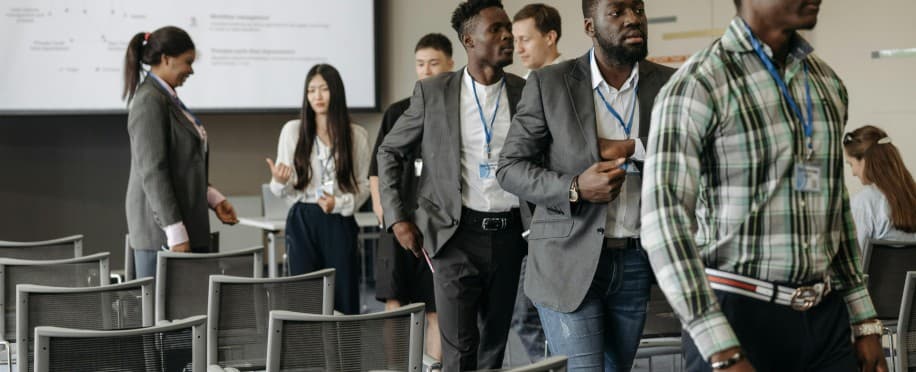Copyright © 2026 lpcentre.com All Rights Reserved. London Premier Centre For Training Ltd Registered in England and Wales, Company Number: 13694538
version: 3.0.1

Building Future Leaders: What Modern Leadership Development Looks Like
Posted on : 11/19/2025, 8:40:16 PM
Last Update : 11/19/2025, 8:40:16 PM
Leadership development has become one of the key indicators of whether an organisation will improve or struggle. Not because leadership is complicated, but because real leadership requires intention and a wide range of capabilities. The way we empower people, the way we influence teams, and the way we show up in moments of pressure all come from comprehensive habits that are built long before a title appears on a business card.
How does this leadership development happen? What sort of qualities and competencies does a successful leader have?
There’s a common misconception that leaders are born with a different kind of wiring that magically achieves success and is naturally innovative. Yet data from the most compelling research, as well as current powerful career stories, point to something far more encouraging: leadership is a learned capability. Developing it comes through practice, nurturing, reflection, struggle, and support.
Modern leadership development doesn’t start with individual charisma. It starts with self-awareness. It invites individuals to examine how they communicate, how they respond to stress, how they guide a team through uncertainty, and how they align decisions with purpose. When organisations invest in this kind of growth, they stop waiting for the “right personality” and begin effectively cultivating leaders who are consistent, grounded, and trusted.
This shift is what separates an organization built on chance from one built on intention. Ones that discover, design and cultivate leaders with Leadership Training Courses in Dubai and others that simply choose from the hiring pool.
Leadership work has become more demanding. Teams expect clarity, stability, and inspiration. Organizations expect sharper thinking and stronger accountability. Employees expect guidance that feels human, not systematic.
That’s why leadership development today is built around real-world complexity. It teaches leaders to make their decision with limited information and implement their strategies for the best outcomes, to navigate change without losing composure, and to support growth through everyday communication rather than heroic gestures.
Once your leadership development plan is set, you begin to recognise how your behaviour influences your team’s energy. You realise how your tone shapes engagement. You understand how strategic thinking blends with personal responsibility.
And you start to lead with presence — not pressure.
The strongest development journeys don’t overwhelm. They provide the kind of structure designed to help individuals develop judgement with confidence in their roles.

There’s a reason many leadership programs fall short: they teach theory without context. They focus on the definition of influence without showing how to influence. They discuss strategy without connecting it to real decisions and steps to the most essential processes.
Meaningful leadership development takes a different approach. It embeds learning into experiences that mirror the challenges leaders actually face. It gives people opportunities to guide a team through a difficult moment, to communicate through tension, to explore mistakes in a safe environment, and to understand which behaviours build trust rather than damage it.
This is where the process becomes transformative.
You don’t simply learn what leaders do.
You learn how to do it in a way that feels natural, relevant, and sustainable.
With the right approach, leadership becomes something you practise daily — not something you wait to inherit someday.
The modern landscape has opened new pathways for growth. Professionals now build their development through in-person learning, coaching, targeted workshops, and online platforms offering flexible courses, structured programs, and self-paced modules. Digital options allow learners to revisit ideas, explore new concepts, and strengthen specific skills at their own rhythm.
But the most impactful leadership development still happens when all these pieces work together.
Great organizations treat leadership as a continuous cycle rather than an event.
In London, Dubai, Barcelona, and Paris, LPC Training supports leadership growth through programmes that respect local culture and organisational realities. but that's not all, across both Istanbul as well as Kuala Lumpur, LPC also helps teams strengthen management behaviours and communication habits.
In Singapore and Amsterdam, LPC pathways guide professionals through leadership habits that turn potential into consistent performance.
This kind of reach matters because effective agile leadership is never one-size-fits-all. The culture, the expectations, the business rhythm, and the human dynamic change from one region to another — and powerful development reflects all of it.
The true impact of leadership development never shows up during the session.
This is the kind of growth that stays with you because it changes how you see yourself. Leadership stops being a role and becomes a responsibility you carry intentionally.
Great leaders aren’t built through flawless performance rather through honest reflection, continuous learning, and a willingness to step forward even when the path feels uncertain.
If you’re willing to learn, you’re already standing at the edge of your next level.
If you’re willing to develop, your future team is already waiting.
Leadership isn’t something you eventually gain.
It’s something you start building the moment you choose to grow.